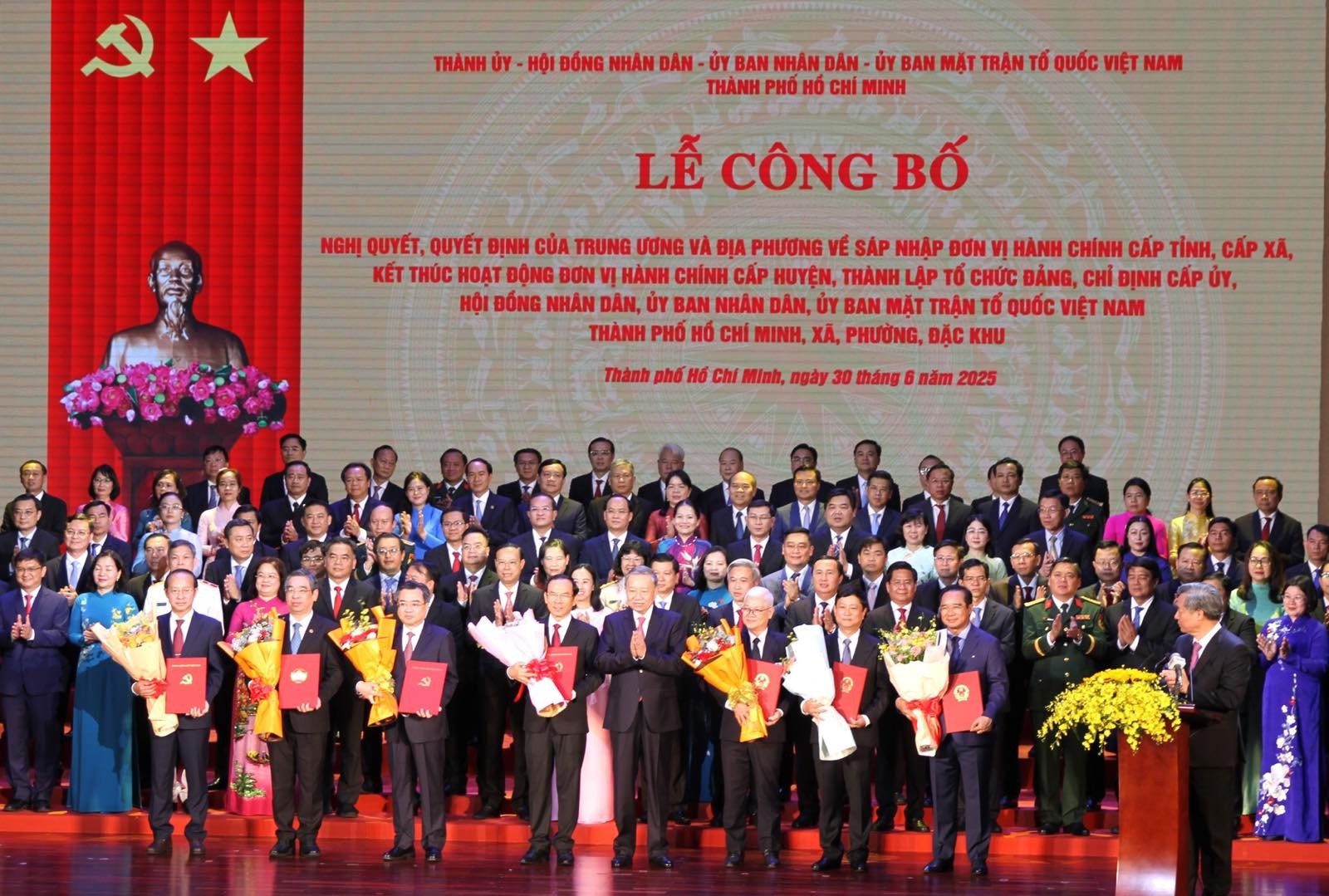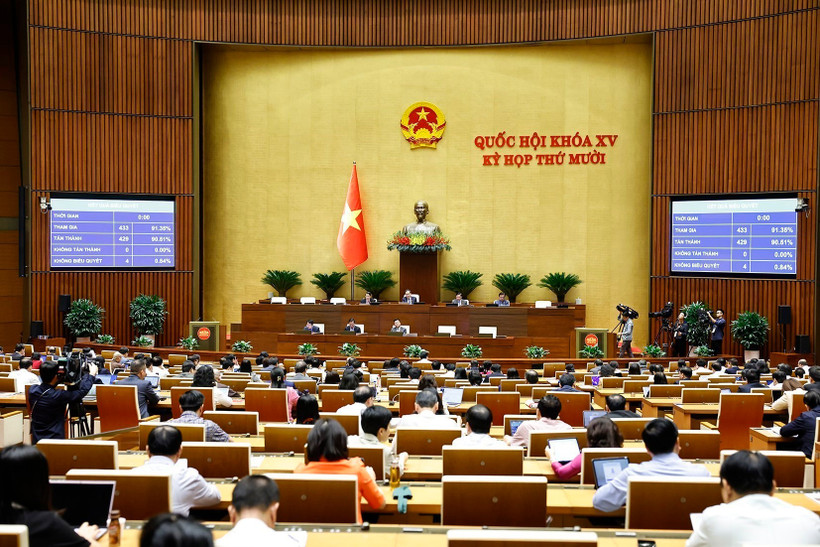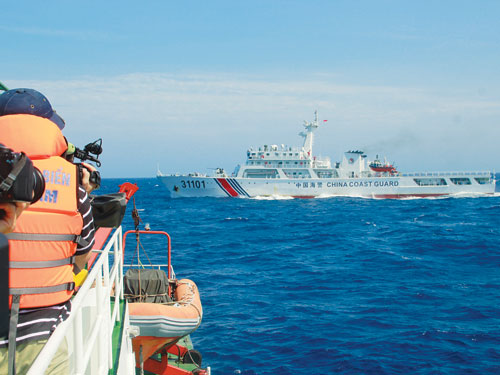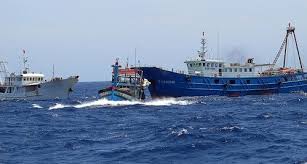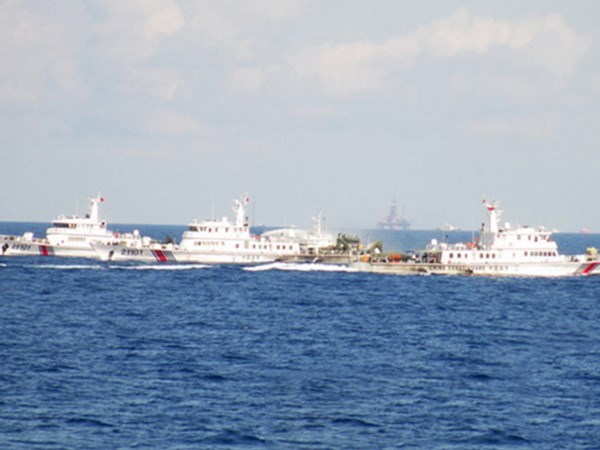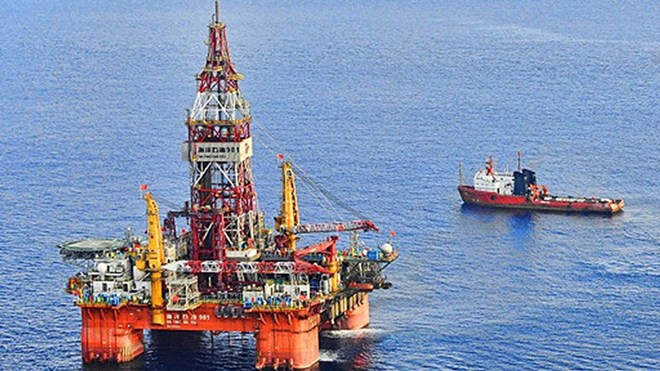China's oil rig and surrounding vessels in Vietnam's waters (Photo: VNA)
Chinese State Councilor Yang Jiechi will attend the dialogue between the Co-chairs of the Steering Committee for bilateral cooperation, the spokesman said at an international press conference in Hanoi on June 16.
Vietnam has exhausted all dialogue channels with China to seek a peaceful solution to the current tension in the East Sea , Binh stated.
Answering a reporter’s question on Vietnam ’s evidence affirming its sovereignty over Hoang Sa (Paracel) and Truong Sa (Spratly) archipelagoes, Vice Chairman of the National Boundary Commission (NBC) Tran Duy Hai said that legal documents from the feudal period show that Vietnam ’s feudal states sent fleets to exploit and perform tasks in the two archipelagoes in early date.
For a country that wishes to set up its sovereignty over a territory, it must exercise activities of sovereignty under the capacity of the State. The documents held by Vietnam are legally recognised to affirm the country’s sovereignty over Hoang Sa and Truong Sa, he stressed.
On a question raised that China said during the French-ruled period, the French colonial administration once recognised China’s sovereignty over Hoang Sa (called “Xisha” by China) and Vietnam’s inheritance from the period’s documents is not true, Hai commented that after entering in Vietnam, on behalf of the Vietnamese administration, France exercised sovereignty over Hoang Sa and Truong Sa, and implemented its administrative management at a high level, such as granting birth certificates to those who were born there.
During the time, France many times opposed China ’s actions in Hoang Sa, by sending diplomatic notes to China , and proposing bringing the issue to an international jurisdiction agency.
In its note sent to the Chinese Embassy in Paris on February 18, 1937, France urged China to address differences through amicable negotiations. “If China disagrees with that, France will have no other way than settling the issue via an arbitrator,” it said.
France always protested China ’s schemes over Hoang Sa, Hai affirmed.
About the Chinese Foreign Ministry’s June 13 request for Vietnam ’s withdrawal from 29 stone islands in Truong Sa archipelago which it said Vietnam is illegally occupying, the NBC representative said that China ’s demand is extremely unreasonable and Vietnam completely rejects it.
Vietnam has sufficient legal and historical evidence to affirm its sovereignty over Truong Sa. In fact, the country has managed and exploited the archipelago in a peaceful and uninterrupted manner.
“It is China that used force to occupy some shoals belonging to Vietnam’s Hoang Sa archipelago. And it’s China that has to withdraw itself from the shoals it illegally occupied in 1988,” Hai affirmed.
On queries raised on whether foreign partners of the Vietnam National Oil and Gas Group (PVN) concerned about China’s illegal rig placement in Vietnam’s waters, Nguyen Quoc Thap, PVN Deputy General Director, said his group had working sessions with US, Russian, Canadian and Indian partners and gained their support for the stance and statement of the group and the Vietnamese Government in the East Sea issue.
They affirmed that the operations of PVN and its associates in the area are legitimate and that they will continue realising the agreements and contracts signed with PVN.
PVN plans to continue working with its foreign partners in implementing its exploring and exploiting activities in an effective manner, said Thap.
VNA
Vietnam has exhausted all dialogue channels with China to seek a peaceful solution to the current tension in the East Sea , Binh stated.
Answering a reporter’s question on Vietnam ’s evidence affirming its sovereignty over Hoang Sa (Paracel) and Truong Sa (Spratly) archipelagoes, Vice Chairman of the National Boundary Commission (NBC) Tran Duy Hai said that legal documents from the feudal period show that Vietnam ’s feudal states sent fleets to exploit and perform tasks in the two archipelagoes in early date.
For a country that wishes to set up its sovereignty over a territory, it must exercise activities of sovereignty under the capacity of the State. The documents held by Vietnam are legally recognised to affirm the country’s sovereignty over Hoang Sa and Truong Sa, he stressed.
On a question raised that China said during the French-ruled period, the French colonial administration once recognised China’s sovereignty over Hoang Sa (called “Xisha” by China) and Vietnam’s inheritance from the period’s documents is not true, Hai commented that after entering in Vietnam, on behalf of the Vietnamese administration, France exercised sovereignty over Hoang Sa and Truong Sa, and implemented its administrative management at a high level, such as granting birth certificates to those who were born there.
During the time, France many times opposed China ’s actions in Hoang Sa, by sending diplomatic notes to China , and proposing bringing the issue to an international jurisdiction agency.
In its note sent to the Chinese Embassy in Paris on February 18, 1937, France urged China to address differences through amicable negotiations. “If China disagrees with that, France will have no other way than settling the issue via an arbitrator,” it said.
France always protested China ’s schemes over Hoang Sa, Hai affirmed.
About the Chinese Foreign Ministry’s June 13 request for Vietnam ’s withdrawal from 29 stone islands in Truong Sa archipelago which it said Vietnam is illegally occupying, the NBC representative said that China ’s demand is extremely unreasonable and Vietnam completely rejects it.
Vietnam has sufficient legal and historical evidence to affirm its sovereignty over Truong Sa. In fact, the country has managed and exploited the archipelago in a peaceful and uninterrupted manner.
“It is China that used force to occupy some shoals belonging to Vietnam’s Hoang Sa archipelago. And it’s China that has to withdraw itself from the shoals it illegally occupied in 1988,” Hai affirmed.
On queries raised on whether foreign partners of the Vietnam National Oil and Gas Group (PVN) concerned about China’s illegal rig placement in Vietnam’s waters, Nguyen Quoc Thap, PVN Deputy General Director, said his group had working sessions with US, Russian, Canadian and Indian partners and gained their support for the stance and statement of the group and the Vietnamese Government in the East Sea issue.
They affirmed that the operations of PVN and its associates in the area are legitimate and that they will continue realising the agreements and contracts signed with PVN.
PVN plans to continue working with its foreign partners in implementing its exploring and exploiting activities in an effective manner, said Thap.
VNA

